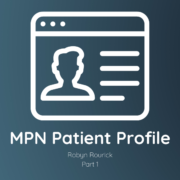Myeloproliferative Neoplasm Basics for Newly Diagnosed Patients
Myeloproliferative Neoplasm Basics for Newly Diagnosed Patients from Patient Empowerment Network on Vimeo.
What do newly diagnosed myeloproliferative neoplasm (MPN) patients need to know? Expert Dr. Idoroenyi Amanam from City of Hope shares how he explains the condition, possible MPN complications, and proactive questions to ask your doctor.
[ACT]IVATION TIP:
“…if you see high platelet counts on a routine blood check or high white blood cell counts or high red blood cell counts, you should ask your doctor to delve a little bit deeper to try to get an answer as to why your counts are presenting in that fashion.”
Related Resources:

|

What Does the Future of Myeloproliferative Neoplasm Care Look Like? |

|
Transcript:
Lisa Hatfield:
Dr. Amanam, how do you explain MPN to your newly diagnosed patients?
Dr. Indoroenyi Amanam:
Yes, MPN is a very rare disorder, and so most patients haven’t heard of MPNs in comparison to breast cancer or colon cancer, and so it’s…sometimes it appears very ambiguous as to what it actually is, and for patients, I generally tell them that there’s some…it’s a disorder that causes increased production of their red blood cells or their platelets, or the cells that help support the tissue in their bone marrow. And there’s some complications associated with that, namely blood clots, strokes, and heart attacks. And there’s also a small risk of these patients converting over into more aggressive blood cancers, namely acute leukemia.
So my activation tip for this question is that, if you see high platelet counts on a routine blood check or high white blood cell counts or high red blood cell counts, you should ask your doctor to delve a little bit deeper to try to get an answer as to why your counts are presenting in that fashion.
Share Your Feedback
Create your own user feedback survey









